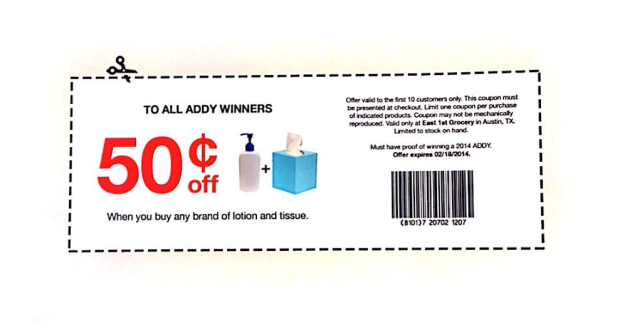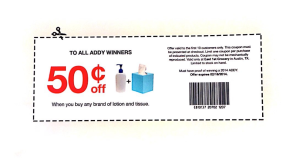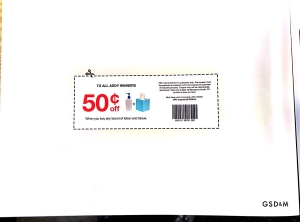Call me an optimist, but thanks to The 3% Conference and The Representation Project, I thought agencies and brands were finally getting the message that you should (at a minimum) try not to insult or ignore women in your ads or your workplace. And then I saw this ad. Let’s take another look at it. (Don’t worry if you don’t understand it, a lot of women didn’t and I’ll explain in a second .)
In case you are not currently an adolescent boy, the visuals in the coupon ad are shorthand for male masturbation.
This is an ad by GSD&M that ran in the local ADDY Awards show and is meant to make fun of how self-involved ad people are. Which is fine. We love laughing at ourselves. But this joke only includes men.
This little ad speaks volumes about the male-dominated culture that still reigns within creative departments practically everywhere. It assumes boy humor is the only humor that matters. And that women in the creative department will laugh unless 1) they’re prudes or 2) they don’t have a sense of humor or 3) they’re too sensitive or 4) they’re just bad creatives.
It rarely occurs to a male CD or ECD to wonder if the puerile joke he thinks is so funny will be at all entertaining to women. And when he does wonder, he simply asks his wife.
GSD&M does some fantastic work. They have been a sponsor of The 3% Conference and this past October, they even sent an executive from their Diversity team to the conference in SF. On their homepage they describe themselves as really nice people who work with “companies who stand for something and companies that want to transcend their categories and be a positive force in people’s lives.”
It’s time for GSD&M to walk their talk. And that means raising their standards of what a good, funny ad is. That means judging creative beyond the male default setting (which can be tough since the agency only has ONE female Creative Director). That means asking, “Is it as good for you as it is for me?” Even when, or especially when, that ad is intended solely for the ad industry itself. It means rising above the crowd when they’re playing in the tired, overused gutter of stereotypes and locker room humor and showing lesser agencies how it’s done.
It means recognizing that there are women in your creative department and they’d like to be in on the joke, too. (Many women were more bored than offended by the ad. )
Speaking of, I asked some women what they thought of the ad. These were my questions:
Is this a clever ad?Does it speak to both men and women in the industry?Does it imply that only men will be winning the ADDY Awards?Is it offensive to you? Is it offensive to most women?Is this creative work something an agency should be proud to submit as an example of their prowess?If you were a young woman considering a career in advertising, would this ad suggest that this industry will value you?
Here’s a smattering of the responses that are indicative of the whole, but I’d like to know what you think.
Q: Does this ad imply that only men will be winning the ADDY Awards?A: I guess it does – unless the women up for ADDY awards are hermaphrodites.Q: Is it offensive to you? Is it offensive to most women?A: Offensive to me as a woman? No. Humor is highly personal so I can’t speak for most women. Plus I have a mouth like a sailor. As a creative woman, I would’ve been offended that the vulgar joke EXCLUDED me.A: I have a good sense of humor and a little of inuendo is funny, but I think this crosses a lot of lines, professionally and gender-ly. I’ve long thought the Addys were getting out of control in this way and just quit even paying attention to them. Never went back to Ad Fed either. Think I voiced my opinion on this the year they had an S&M theme for the ceremony. Shaking my head…
A: Yes, this is offensive to me..It’s offensive to women because it:1. Leaves us out of the joke2. Marginalizes3. Makes it “uncool” to be offended by masturbation4. Trivializes the power of advertising.Q: Is this creative work something an agency should be proud to submit as an example of their prowess?A: No. It’s weak creative, frankly.A: I’d fire whoever approved this.A: This is clever if you have an IQ of 85!It really spoke to my 18 year old son and to a 56 year old fireman. They both said that only idiots use tissue.A: Okay, this ad makes ZERO sense to me. I don’t get it at allA: I didn’t get it…. In fact, I found it so perplexing, I asked my husband to look at it. Oddly enough, he got it right away….!Q: If you were a young woman considering a career in advertising, would this ad suggest that this industry will value you?A: How can you say you value something you routinely exclude or ignore? Unless you need to market tampons….A: It would tell me that despite this being 2014, despite the fact that more women enter college than men, despite the fact that women are now starting more businesses than men, despite the fact that well over 85% of purchasing decisions are made by women, that if you want to be part of this industry, you have to join the fraternity of dunces, pretend to be a pubescent, frustrated adolescent boy who’s highest priority is not to leave the world a better place, but to instead focus on his pee pee.
The ad above is an idea any male creative could have over one beer. Probably the first thing they scribbled down. I don’t begrudge them working fast. I’m challenging them to think beyond boy humor, include women and strive for something that’s more universal and intelligent. Think beyond your own narrow ideas of taste.
And for all you female CDs (all one or two of you) please have the courage to send guys back to the drawing board. You’re our best hope for keeping ads like these in the circular file where they belong.


